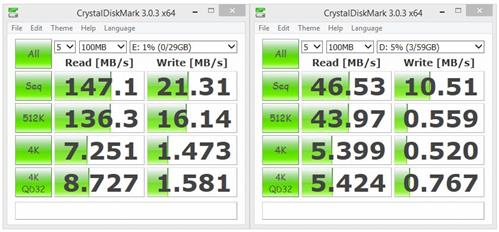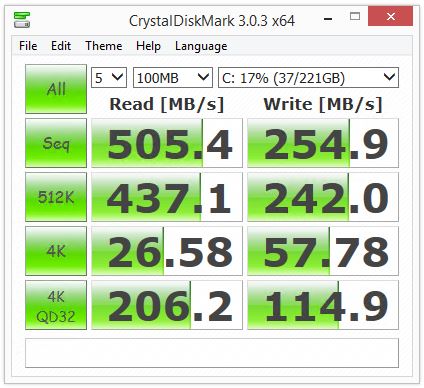One thing I’ve noticed lately when it comes to breathless hype about Windows tablet storage is the fairly blithe assumption that by adding a micro-SDXC memory card, problems can be staved off or avoided. With a 64 GB (fairly affordable at around $35 to 60, depending on speed) or 128 GB (not yet affordable, with only one SanDisk model at around $120 currently available) card one can indeed extend the storage available to most Windows tablets (including the recently-announced Surface Pro 3 from Microsoft, plus countless others). But there’s something else about this form of storage that savvy buyers will wish to ponder as well, as illustrated in this side-by-side set of screen caps from the CrystalDiskMark disk speed analysis tool
USB 3 on the left, microSD card on the right: which would you prefer?
It doesn’t take a rocket scientist to observe that speeds from the Mushkin 32 GB USB 3 Atom flash drive on the left vastly outstrip those from the SanDisk Ultra 64 micro-SDXC USH-1 card on the right, even though the SDXC card is rated at about as fast as such cards get, while the Mushkin Atom is by no means near the top of USB 3.0 UFD speed ratings. Methinks the interface for the card reader plays a significant role here on the Fujitsu Q704 tablet where I ran the test, and on other tablets as well.
There are two interesting take-aways from these speed measurements — namely
1. If you are going to use a micro-SDXC card to extend storage on a tablet, you’d better not expect it to run anywhere near as fast as the built-in SSD does, nor even as fast as plugging in an external USB 3 UFD. This also suggests that spending extra $$$ on faster SDXC cards may not be worth the added expense (though I’d want to test slower models to see how much slower they wind up going to be doubly-darn sure about that).
But then again, the SSD is oodles faster than either USB or micro-SD.
2. If you have to choose between a bigger UFD (size-wise that is, as anything over 32 GB requires a bigger “stick” in which to store the necessary memory chips) and a micro-SDXC card, the UFD clearly comes out ahead on performance, while the micro-SDXC card comes out ahead in compactness and lack of added external protrusions to carry and keep track of. Only you can decide which of those trade-offs is most worth making in your particular circumstances.
As for me, I’m opting for performance and capacity by using fast UFDs like the Mushkin Ventura Pro or the ADATA S102. Sure, they stick out from the side of the tablet, but they rock the speed and provide plenty of capacity. Then again, something like the newly-minted Corsair Flash Voyager GTX (just announced this week at Computex in Taipei) which includes an SSD-level flash controller and high-speed flash circuitry, might be just the ticket (for other options in this class of expensive peripherals check out Les Tokar’s USB 3.0 Archives at The SSD Review).


See the comments back and forth on this post between myself and long-time writer, researcher, and TCP/IP guy Charles Kozierok at https://www.facebook.com/ed.tittel/posts/10204026311199762
Dear AQ: given that USB/SDXC remains fundamentally the same for both Windows and OSX machines, for speed you would choose the USB key, but for compactness and/or affordable capacity SDXC. You have to make that tradeoff for yourself to pick what’s best for your needs.
–Ed–
Hi Ed:
A little late to the game here. I recently bought a new Q704 from Fujitsu on the Ebay store and a used keyboard dock from Ebay. I have been having connectivity issues between the keyboard and the tablet stating that it does not recognize the USB device. I can’t type or use any other functions. If I reboot, sometimes it works. I have tried the update driver for the keyboard. Do you possibly know of a fix. I did change the settings for suspending the USB ports on battery and A/C as you suggested in a post.
Thank you for your time,
Karl
Dear Karl:
You’ve pretty much exhausted my store of suggestions here. You might try looking for a Q704 forum online to interact with current owners to see if they have other ideas. I sold my Q704 more than one year ago, and don’t really remember all the details. I do remember that the dock worked flawlessly with the unit from the get-go, so my intuition tells me you may have a dock issue.
Best of luck in resolving your situation.
–Ed–